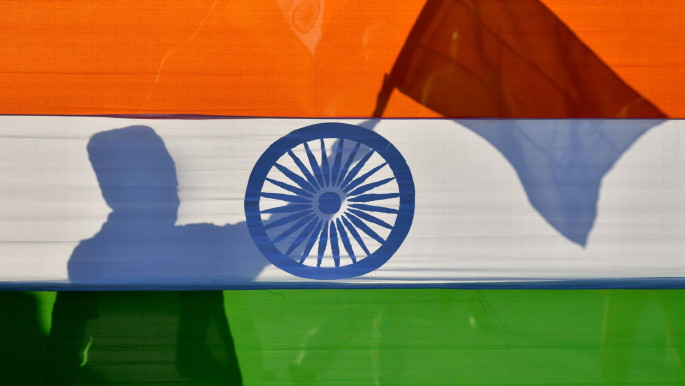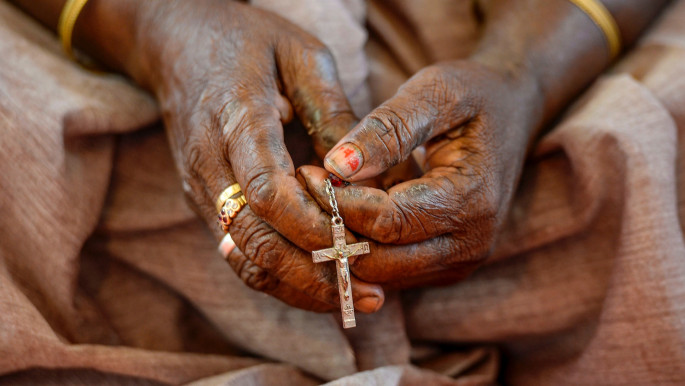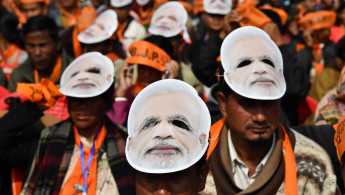How Facebook stifles local media in India to protect the ruling BJP
It all began when the social media giant censored content criticising Yogi Adityanath, a hardline Hindu nationalist who is the Bharatiya Janata Party's (BJP) chief minister for Uttar Pradesh, India's largest state.
Facebook then temporarily blocked the weekly English-language newspaper from posting on its social media page. Several other regional media outlets in India have also accused Facebook of either limiting the visibility of many of their posts or simply flagging content that is critical of India's ruling BJP, led by Narendra Modi.
"After some of the posts regarding him (Yogi Adityanath) were taken down, our page was blocked and subsequently, in a random manner, some 2,000 of our posts were flagged," Qazi Zaid, the Editor-in-Chief of FPK, told The New Arab.
"Those posts were not being reported by people or any right-wing groups as there was no visible negative feedback on them, rather I suspect it was being done internally in Facebook."
 |
Regional media outlets accuse Facebook of limiting the visibility of their posts or simply flagging content that is critical of India's ruling BJP |  |
For some time now, Facebook has been at the centre of an international debate over social media content policies. In India too, Facebook has been mired in controversy over allegations that it has not been stringently applying hate speech rules to BJP officials, many of whom have made inflammatory comments against Muslims.
After growing pressure, including an open letter from Facebook employees urging the company's leadership to denounce "anti-Muslim bigotry", the social media giant on Thursday banned firebrand BJP politician Raja Singh.
 |
|
| Read more: India's new media policy tightens the noose on Kashmiri journalists |
The politician, who had been at the centre of the growing controversy, was deemed to have promoted "violence and hate". Up until the ban he had been fiercely defended by Facebook's top policy official in India, Ankhi Das, who argued that censoring him would damage Facebook's "business prospects" in the country.
While smaller media outlets complain that they bear the brunt of Facebook's content policies, there is increasing evidence that the company has also demonstrated an unwillingness to regulate hate speech by pages promoting the BJP's agenda.
The Hindu nationalist party is reportedly the leading spender on political advertisements on Facebook India, with the highest expenditure in the categories of "social issues, elections and politics".
Facebook's spending tracker found that the total spending of the BJP and its four affiliate pages constituted up to 64 percent of total advertising for the top ten pages in those categories. Since February 2019, the BJP is thought to have spent more than $600,000 on FB adverts.
 |
Facebook has been mired in controversy over allegations that it has not been stringently applying hate speech rules to BJP officials |  |
Stifling local media
Delhi-based media organisation Muslim Mirror - catering primarily to minority audiences - has faced similar regulations to FPK on their Facebook page, with many of their posts flagged.
"Primarily, news links critical of the BJP, Israel and videos purportedly depicting violence in the Palestinian territories are targeted, even though such posts are already available on the internet elsewhere," Syed Zubair Ahmed, Editor of the Muslim Mirror, told The New Arab.
"This series of censorship began mostly around 2018. Sometimes for months we were suspended from posting any news content on our page. Posts carrying words like 'Zionism' were at once shadowed. Earlier, we had an extensive virtual reach to our followers and posts elicited hundreds of likes. We have now drastically plummeted to single figures," he added.
 |
|
| How India is clamping down on Muslim activists under the cover of coronavirus |
Similarly, in 2018 Free Press Kashmir published a story on the Kerala floods which used a cartoon of Narendra Modi. It was immediately taken down by Facebook, and many of the news links on their social media page were marked as "sensitive content".
Facebook 'favouring' the BJP
Some experts claim that Facebook's regulations against regional media organisations in India revolve around an attempt to reduce their online audiences.
"This type of censorship - by limiting their post reach - solidifies the allegations of a biased political stance. Mainstream media in India is in the lap of the BJP. By censoring the small regional press which is devoid of their influence, only one side is benefitting," Gowhar Farooq, a media researcher working at AJK Mass Communication Research Centre in New Delhi, told The New Arab.
Several reports suggest Facebook has been making concessions to the ruling BJP. Last year, the social media platform removed hundreds of pages linked to both the BJP and its arch rival the Indian National Congress (INC) for violating its policies, but didn't mention the BJP's name in its official press release.
 |
The Hindu nationalist BJP is India's leading spender on political advertisements on Facebook |  |
Zaheer ud Din Ali Khan, editor of Siasat Daily - a regional daily published from Hyderabad - says Facebook has stagnated the news outlet's growth on its platform. "We started our page in 2012 and grew exponentially over the next two years. In the year of 2014, our follower count had reached 1.4 million people. We were expecting to increase our reach to two million over the next three years, but suddenly our readership coverage was restricted."
Siasat Daily positions itself as a voice of the Muslim community in India and caters to a large audience in the country. While they have received no specific reason as to why their reach is steadily witnessing a decline, Khan suspects there is preferential treatment at play. "I think there is a specific lobby working in social media organisations who are trying to hurt and curtail news giving preference to minority voices," he said.
 |
|
| In Modi's Hindu nationalist India, anti-Christian violence is on the rise |
A report by The Wall Street Journal had already stirred a huge debate in India regarding how Facebook - particularly during the anti-Muslim riots in New Delhi - overlooked posts by different BJP leaders which directly violated its hate speech rules.
In February this year, Delhi was ravaged by the worst violence witnessed in decades, in which 53 people, mostly Muslims, died. Various BJP leaders were accused of posting content inciting communal violence, which was not removed by the social media giant.
Facebook India officials did not respond to The New Arab's requests for comment.
Kunal Majumdar, India Correspondent for the Committee for Protection of Journalists (CPJ), acknowledges that they have received complaints of alleged censorship by Facebook from various local news organisations.
"In many instances, pages have been pulled down without proper assessment. Only a few days ago a page on Gauri Lankesh (a former Indian journalist-turned-activist who was assassinated) was suspended, but after an online outrage there was a re-assessment and it was restored. We have received many similar cases particularly from Indian-administered Kashmir."
Majumdar says, however, that it is becoming increasingly difficult to gauge what is being censored and what is not because of Facebook's new algorithms, which limit a page's reach based on its interactions with followers so that pages have to pay to boost their content. "So, in this situation it becomes unclear whether the restricted viewership is intentional or not."
Hanan Zaffar is a journalist based in New Delhi and has written extensively on South Asian politics and minority issues. Follow him on Twitter: @HananZaffar
Aamir Aijaz is a freelance journalist based in Indian-administered Kashmir. Follow him on Twitter: @kaamir_Khan



